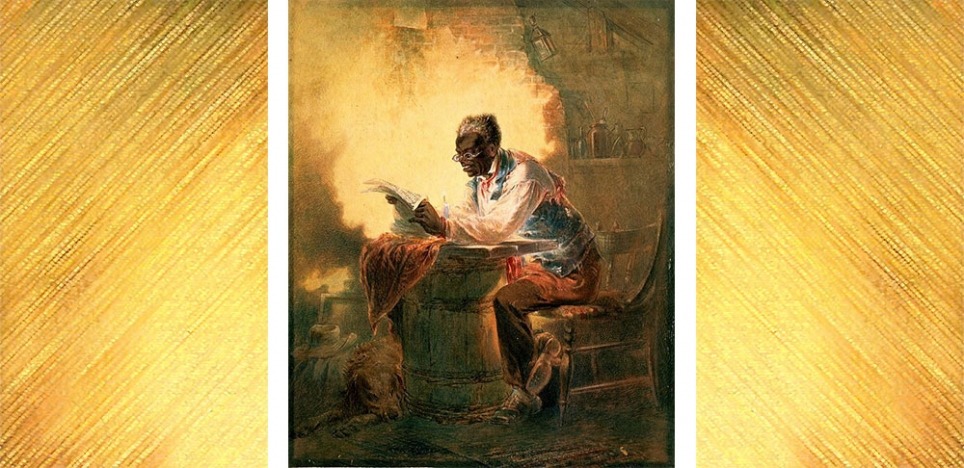Image credit: Henry Louis Stephens (1824–1882), man reading a newspaper with headline, "Presidential Proclamation, Slavery." Library of Congress, Prints & Photographs Division.
The Emancipation Proclamation, issued during the Civil War by President Abraham Lincoln on this day in 1863, was a calculated military move — upon which a crucial spiritual principle rode. The September before, Lincoln had warned that in four months, anyone still held as a slave in a Confederate state would be given freedom:
"... on the 1st day of January, AD 1863, all persons held as slaves within any State or designated part of a State the people whereof shall then be in rebellion against the United States shall be then, thenceforward and forever free ..."
The New Year's proclamation which cemented this promise did not apply to enslaved African Americans in the four loyal slave states and in Confederate lands already captured by the Union, so this proclamation was still far from universal. Criticism came from many directions, including this mockery from the London Spectator: "The principle is not that a human being cannot justly own another, but that he cannot own him unless he is loyal to the United States."
These criticisms, however, miss the mark, in the opinion of Jay Winik, author of April 1865: "The Emancipation Proclamation was the most revolutionary document in the country's history since the Declaration of Independence; it truly began the end of slavery, in the North and the South. The psychological impact of the proclamation cannot be overestimated. Lincoln, in a masterful stroke, had become a personal emblem of freedom, and the Emancipation Proclamation was its parchment."
To Name This Day . . .
 Quotes
Quotes
"... I do order and declare that all persons held as slaves within said designated States, and parts of States, are, and henceforward shall be free; and that the Executive government of the United States, including the military and naval authorities thereof, will recognize and maintain the freedom of said persons.
"And I hereby enjoin upon the people so declared to be free to abstain from all violence, unless in necessary self-defence; and I recommend to them that, in all cases when allowed, they labor faithfully for reasonable wages.
"And I further declare and make known, that such persons of suitable condition, will be received into the armed service of the United States to garrison forts, positions, stations, and other places, and to man vessels of all sorts in said service.
"And upon this act, sincerely believed to be an act of justice, warranted by the Constitution, upon military necessity, I invoke the considerate judgment of mankind, and the gracious favor of Almighty God...."
— Abraham Lincoln in the Emancipation Proclamation (excerpt)
"We weren't there in Texas long when the soldiers marched in to tell us that we were free. ... I remember one woman. She jumped on a barrel and she shouted. She jumped off and she shouted. She jumped back on again and shouted some more. She kept that up for a long time, just jumping on a barrel and back off again."
— Anna Woods, interviewed by the Federal Writers' Project and quoted in A People's History of the United States by Howard Zinn
"The slaves went from being frightened human beings, thrown among strange men, including fellow slaves who were not their kinsmen and who did not speak their language or understand their customs and habits, to what W. E. B. DuBois once described as the general strike whereby hundreds of thousands of slaves deserted the plantations, destroying the South's ability to supply its army."
— George P. Rawick in From Sundown to Sunup: The Making of the Black Community
 Personal Exploration
Personal Exploration
In A People's History of the United States, Howard Zinn quotes a freed slave who wrote that "if the strict law of right and justice is to be observed, the country around me is the entailed inheritance of the Americans of African descent, purchased by the invaluable labor of our ancestors, through a life of tears and groans, under the lash and yoke of tyranny." His words remind us that reparations for slavery's cruelty are far, far from complete. We all play a role in the search for healing, and it's not easy to find our way without fear.
Gregory C. Ellison II, Associate Professor of Pastoral Care and Counseling at Candler School of Theology, Emory University, writes in Fearless Dialogues, "An antidote to fear, 'lessness' is a posture of humility, perceptiveness, and intention not to lord over others. This posture resists the temptations of possessing all the answers, and yields to the mysterious journey of raising questions."
What are some of your unanswered questions about America's history of slavery and racism as you see them manifest in your life? What is it about your identity and your gifts that can bring emancipation one step further?
